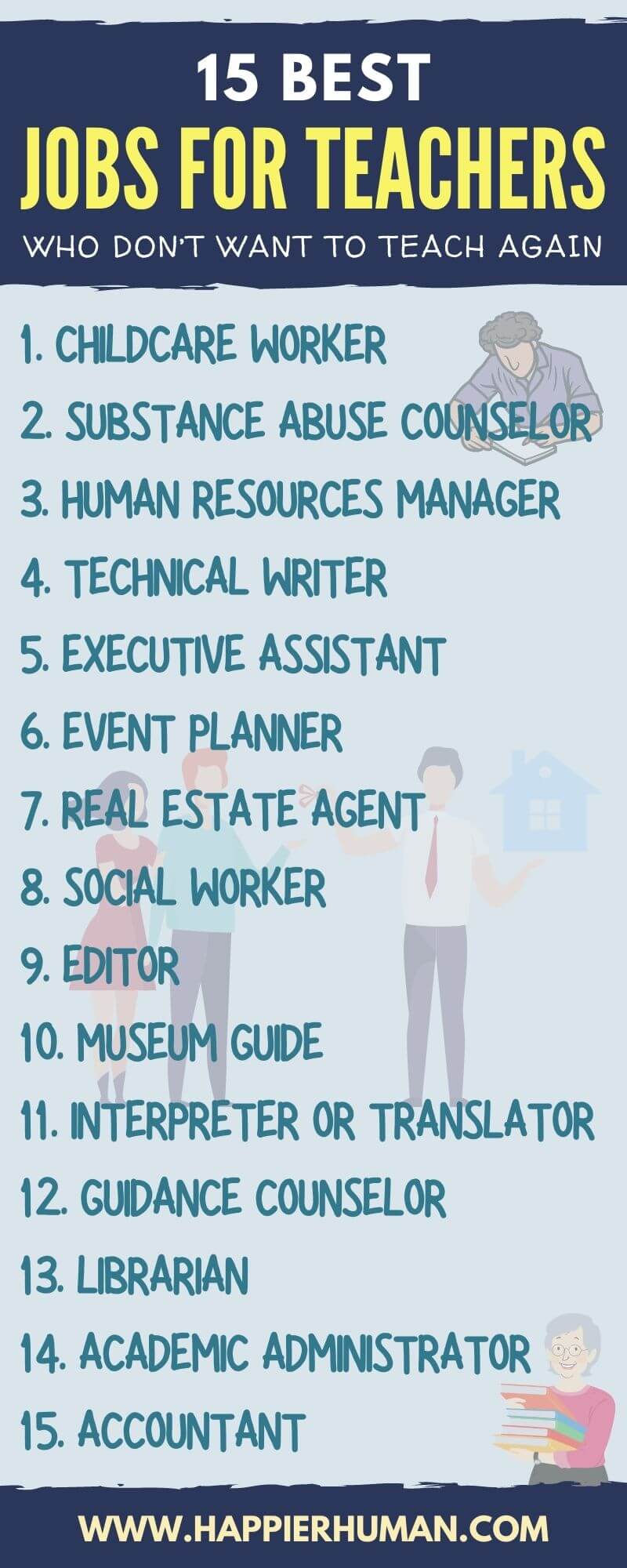Are you tired of teaching?
Or do you want to go in a different direction in life?
If you’ve decided to leave teaching, then you’re probably wondering what your next step is.
Finding a job that suits your interests and talents changes your sense of personal fulfillment. But it can be challenging to figure out that perfect career path beyond teaching.
So in this article, we’ve compiled a list of 15 jobs for teachers who don’t want to teach anymore.
Let’s get to it.
1. Childcare Worker
Working in childcare offers many different opportunities. As a former teacher, you’ve had plenty of experience taking care of kids.
Although working in childcare isn’t generally a high-paying job, you might be surprised at the opportunities you find. With lots of options for part-time work, this can be an excellent option for former teachers who are getting close to retirement age.
Working in childcare can mean assisting at a daycare or nursery, providing after school care, supervising extracurricular activities, and more. It might also mean in-home childcare services like nannying.
Median Salary: $23,760
Education Required: High school degree; early childhood education degree helpful but not necessary.
How to get started: Search for opportunities in your area and submit applications
2. Substance Abuse Counselor
Substance abuse counselors are all about helping people and making plans for improving lives. This might be one reason why some former teachers are drawn to similar positions when they leave teaching.
Entry-level jobs don’t necessarily require special certifications or degrees (aside from a general bachelor’s degree). As you advance, you will probably need to accrue special licenses and certifications.

Substance abuse counselors also use many of the same skills that teachers do. This includes organization, mediation, and working one-on-one with individuals.
Average Salary: $39,750
Education required: Bachelor’s degree, preferably in psychology, sociology, or social work.
How to get started: Get a relevant degree and work required credit hours to earn your license
3. Human Resources Manager
You might wonder what teachers and human resources managers have in common. Actually, they use a lot of the same skills. Teachers often find themselves resolving conflicts and helping people develop skills in the classroom. Human resources managers do the same thing.
But even more importantly, they help people shape their future. Human resources managers assist in recruiting new employees and training them for their jobs. Training is the same as teaching, so it’s right up the alley of anyone who knows how to help others learn and develop new skills.
Average Salary: $51,498
Education required: Bachelor’s degree, preferably in human resources, finance, or business.
How to get started: Inquire into an internship or other relevant experience
4. Technical Writer
Being a teacher often involves writing, whether you’re teaching the skill yourself or writing lesson plans. Becoming a technical writer is a perfect fit.
Technical writers write all kinds of copy for everything from magazines to websites, advertisements, blog articles, and more. It’s a fast-paced and exciting job that is great for anyone who has writing skills. Technical writers often work as freelancers and usually from home.
There is no special training required to become a technical writer, but you will need to develop a few special skills. You will keep learning more as time goes on. Experience makes technical writers even more hirable.
Average Salary: $60,565 but can vary for freelancers
Education required: None.
How to get started: Sign up on a writing job board or start applying for writing jobs
5. Executive Assistant
If there’s one thing that teachers know how to do, it’s staying organized — even if they’re keeping tabs on 100 items simultaneously. These qualities of focus, organization, and multitasking are perfect for a personal assistant or secretary.
Some assistant jobs require you to have a degree in business administration or something similar. However, others don’t have any particular requirements except a college or even a high school degree.
Executive assistant jobs might seem like tedious work, but they can actually be exciting. You will be meeting many new people every day, and there’s always work to be done. It’s a great way to prime your organizational and communication skills while also making a paycheck.
Average Salary: $69,280
Education required: High school diploma.
How to get started: Start applying for jobs on a certified job site
6. Event Planner
Another great way to use those organizational skills that you learned during your teaching days? Become an event planner. Event planners organize everything from weddings to shows, conventions, and business events.
This is a job that is incredibly hands-on and requires the ability to multitask. You’ll need to have a lot of energy and be great at communicating with a variety of people.
How else does this tie in with teaching? Teachers are expert planners. Whether it’s organizing a class event, field trip, assembly, or holiday party, they know what it’s like to have a million small tasks to do.

Many people find event planning a rewarding venture because you’re helping people shape important moments in their lives. They also love the fast pace of the job and the chance to work with new people in various industries.
Average Salary: $49,351
Education required: No college degree is strictly required, but a bachelor’s in business, public relations, or hospitality management is helpful.
How to get started: If you have past experience, create a portfolio for potential clients. Otherwise, inquire into getting relevant industry experience.
7. Real Estate Agent
If you loved the social aspects of teaching, you might enjoy being a real estate agent. This job is for those who are great with people and skilled at communicating. But that’s not all that goes into it. You also need to have a talent for negotiating deals.
One reason former teachers might excel as real estate agents is that it takes the ability to stay organized and multitask. And, as you’re probably not surprised to hear, there is a lot of paperwork involved. Using the interpersonal skills you learned as a teacher can help you succeed as a real estate agent.
What’s more, this job involves a lot of moving around and going to different places. For many people, that’s a welcome change after a career spent in an office or classroom.
Real estate agents don’t need any special education to get started, though they do need a license.
Average Salary: $42,757
Education required: High school diploma.
How to get started: Take your state’s pre-licensing course and pass the licensing exam
8. Social Worker
Social workers use interpersonal skills and counseling — among many other talents — to help all kinds of people. Some social workers assist the elderly in finding resources, while others work in the foster care system or help people get mental healthcare.
The reason this job might appeal to former teachers is simple: it’s all about connecting with people one-on-one and helping them build a better future. If you enjoyed personal connections with your students as a teacher, social work might be a good choice for you.
Social work is a reasonably secure job field, with workers in high demand. However, if you don’t already have a bachelor’s degree in social work, you may have to return to school to get a degree before you can start.
Average Salary: $47,970
Education required: Bachelor’s degree in social work.
How to get started: Get a social work degree and complete your required internship hours
9. Editor
Editing, much like technical writing, is a varied and exciting job. You’ll always be getting new work on subjects you never knew. This is a big incentive for former teachers since it means you’ll be learning new things every day.
Editing and writing are other forms of education. Much editing work is making informational articles more readable and articulate.
If you have a good grasp of grammar and spelling, you will make a fantastic editor. Most editors work on a freelance or contract basis, usually from the comfort of their own homes.
As a freelancer, you’ll choose your own hours and set your own rates, which brings a lot of freedom to the job. There is no special education required. All you need is an eye for detail and a sense of good writing.
Average Salary: $48,117
Education required: None.
How to get started: Apply on a freelance or job site
Sidenote: If you want to learn a new skill quickly, then the key is to only focus on the information that can be immediately applied. This is where just in time learning can help you. Watch the video below to learn the 5 simple steps you can use to master any skill in a short amount of time:
10. Museum Guide
You might not want to teach in a classroom setting anymore, but that doesn’t mean you can’t find another way to share your knowledge. A museum guide is a perfect job for anyone who loves to educate.
You’ll have the chance to meet new people every day and talk about the amazing displays at your local museum. You might find yourself talking about history, culture, art, and more.
Many museums also host special events or programs. They are often looking for people with special knowledge to help plan and develop these. If you have niche knowledge as a former history or art teacher, this could be the perfect job for you.
Average Salary: $49,791
Education required: High school diploma.
How to get started: Submit applications to local museums
11. Interpreter or Translator
If you’ve ever taught a foreign language — or if you know one of your own accord — interpreting or translating could be great options for you.
Interpretation and translation are involved in many different jobs in many different sectors. There is always the opportunity for variety and adventure in these fields.

Interpretation, in particular, requires total fluency. It also requires mental agility and the ability to switch seamlessly back and forth between two languages. But this high-stakes job is likely to put you in some exciting situations, with the possibility of traveling to foreign countries.
Translation is a lower-stakes job. In this capacity, you’ll probably be translating documents from home. But many former teachers find that this gives them the chance to explore exciting new subjects while flexing their linguistic muscles.
Average Salary: $49,930
Education required: Bachelor’s degree (fluency in two languages is more important)
How to get started: Take an interpreter course and earn a certificate; if looking into translator work, take online language proficiency tests to demonstrate fluency in both languages
12. Guidance Counselor
If you don’t want to work in a classroom anymore but love working with and helping students, a guidance counselor might be a great fit for you.
But guidance counselors don’t just work at schools. There are also positions for them in adult career centers, companies, charities, and even government.
Guidance counselors work with people one-on-one and help them figure out what career path they want to follow. Then they help connect them with the resources and education they need to get started.
It can be an extremely rewarding job, as it’s all about helping others improve their lives.
Average Salary: $50,831
Education required: Master’s degree.
How to get started: Research your state’s requirements; you may need to do an internship or pass guidance counselor certification
13. Librarian
If you love teaching, organizing, and reading, you might enjoy being a librarian. Some library positions even include working with children, which is an excellent return to your classroom days.
Becoming a librarian has different educational requirements depending on where you plan to apply for work. Suppose you want to work at a university or high school library. In that case, you will probably need a Master’s in library science. However, if you want to work at a public library, the education requirements are likely to be a bit laxer.
Average Salary: $66,236
Education required: Master’s degree in library science.
How to get started: Research your state’s requirements for professional librarian certification
14. Academic Administrator
Just because you don’t want to teach anymore doesn’t mean there aren’t still careers for you in the field of education. You can still help students prepare for their future in other capacities.
Academic administrators may work in a secretarial capacity. Or they may be in charge of running an entire section of a school’s or school district’s operations.

Being an administrator isn’t all just paperwork. You’ll probably also be a part of faculty meetings, talk to parents, and help students access learning resources. It’s a great way to work with a diverse group of people, including students, faculty, and staff.
If you start looking for jobs in administration in the school where you were formerly a teacher, you already have an advantage. Not only will you already have an idea of how school operations work, but you’ll also already have a reputation as a trusted faculty member.
Average Salary: $46,797
Education required: Bachelor’s degree in education or Master’s in education administration (depending on the institution)
How to get started: If you have the relevant degree and experience, apply for jobs
15. Accountant
If you’re a former math teacher, you might enjoy becoming an accountant or financial advisor. Being an accountant is mostly desk work, but that’s not all it is.
If you’re helping others with their finances, you’ll need to schedule meetings. This gives you the chance to help them understand the numbers to adjust their future financial decisions accordingly.
Many former teachers find roles like this rewarding because they let you enjoy a quieter job while continuing to help people.
Accounting jobs are available in almost any industry you can imagine. In the meantime, financial advisors might find themselves working with someone new every day to help them understand and improve their finances.
Even if you have a strong background in mathematics, you’ll still need to become a certified accountant to accept work. This involves passing an accounting certification exam to prove your credentials.
Average Salary: $51,546
Education required: Relevant bachelor’s degree.
How to get started: Pass an accounting certification exam.
Final Thoughts on Jobs for Teachers Who Don't Want to Teach
Leaving an established career is a challenge. But finding a new career that suits you can help you feel personally successful and fulfilled.
It’s not impossible to change careers, but it takes bravery and determination. Ultimately, however, it’s the best choice to reach your goals.
If you’ve been thinking of leaving teaching, consider what career path might be right for you.
With careful planning, you can find the perfect job to find personal fulfillment.
And if you're looking for other potential jobs, check out these blog posts:
- 15 Best Jobs & Careers for Highly Sensitive Persons (HSPS)
- 9 Best Paying Jobs (and Careers) for an INFP
- 15 Best Online Tutoring Jobs for Teachers & Stay-at-Home Parents
Finally, if you want to find the best career for your personality, then take this FREE career test that matches your personality and interests to real-world careers.


